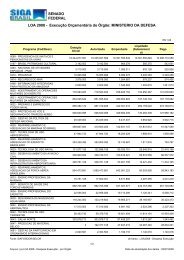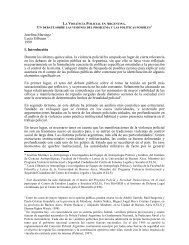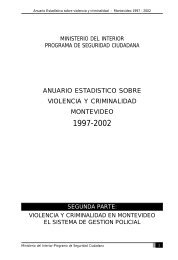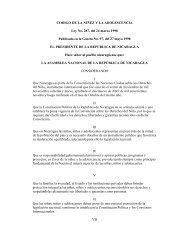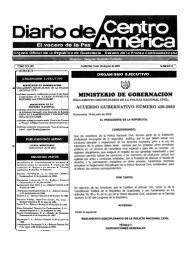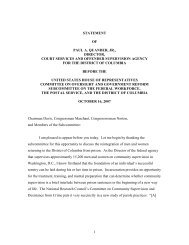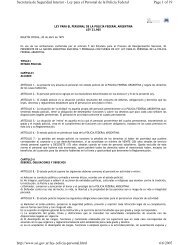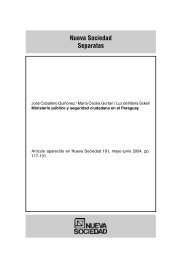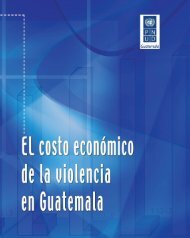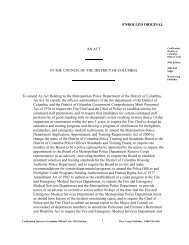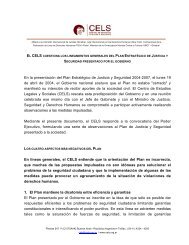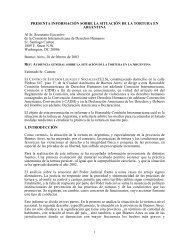Venezuela: The Life and Times of the Party System - Political ...
Venezuela: The Life and Times of the Party System - Political ...
Venezuela: The Life and Times of the Party System - Political ...
Create successful ePaper yourself
Turn your PDF publications into a flip-book with our unique Google optimized e-Paper software.
system as used in <strong>Venezuela</strong> works to <strong>the</strong> advantage <strong>of</strong> large parties. It also favors coalitions,<br />
<strong>and</strong> counters <strong>the</strong> dispersion <strong>of</strong> votes (see Rey 1986, 42 <strong>and</strong> Rausseo 1981, 42-44). <strong>The</strong> task <strong>of</strong><br />
raising this issue has fallen almost entirely to <strong>the</strong> minority parties, in particular <strong>the</strong> MAS (see<br />
Molina 1989 <strong>and</strong> MAS 1989). According to leaders <strong>of</strong> MAS, <strong>the</strong> three elements used to distribute<br />
seats (<strong>the</strong> electoral formula, <strong>the</strong> size <strong>of</strong> districts, <strong>and</strong> mechanisms for final compensation) have<br />
distorted <strong>Venezuela</strong>n PR to <strong>the</strong> detriment <strong>of</strong> smaller groups <strong>and</strong> factions. 1<br />
Efforts to reform <strong>the</strong> electoral system also respond to changes in <strong>Venezuela</strong>n electoral<br />
behavior which some attribute to deficiencies <strong>of</strong> <strong>the</strong> electoral system itself. In particular, <strong>the</strong><br />
increase in abstention over <strong>the</strong> past several elections is seen as a reason for electoral reform, in<br />
<strong>the</strong> belief that change is needed to bring about greater participation by <strong>the</strong> electorate. Until<br />
recently, <strong>Venezuela</strong> pointed with pride to its high levels <strong>of</strong> electoral participation. Never<strong>the</strong>less,<br />
since <strong>the</strong> first election for municipal councils (1979) <strong>and</strong> in <strong>the</strong> subsequent local contests, <strong>the</strong><br />
level <strong>of</strong> abstention has increased. In <strong>the</strong> national elections <strong>of</strong> 1978 <strong>the</strong> rate <strong>of</strong> abstention was<br />
12.4 percent, while in <strong>the</strong> municipal elections <strong>of</strong> 1979 this figure climbed to 27.1 percent.<br />
Whereas abstention was 12.1 percent in <strong>the</strong> 1983 national elections, in <strong>the</strong> municipal elections<br />
<strong>the</strong> following year it reached 40.7 percent. Finally, in <strong>the</strong> national elections <strong>of</strong> 1988 abstention<br />
was 18.3 percent, <strong>and</strong> in <strong>the</strong> recent elections for state governors, mayors, <strong>and</strong> municipal<br />
authorities <strong>the</strong> figure soared to 54.8 percent. 2 In a system that views voting as a civic duty <strong>and</strong><br />
as a pledge <strong>of</strong> adherence to <strong>the</strong> democratic regime, such a rise in abstention causes serious<br />
concern. Inasmuch as voting (or, perhaps more accurately, voting for AD or COPEI) <strong>and</strong> support<br />
for democracy have long been linked both practically <strong>and</strong> ideologically, abstention looms as a real<br />
problem, especially given <strong>the</strong> broader context <strong>of</strong> increasing criticism <strong>of</strong> <strong>the</strong> political system as a<br />
whole.<br />
Reforms Put into Practice<br />
<strong>The</strong> adoption in 1978 <strong>of</strong> <strong>the</strong> Ley Orgánica del Régimen Municipal was an attempt to give<br />
autonomy <strong>and</strong> administrative viability to municipalities (see Linsey <strong>and</strong> Herrera 1980). This<br />
initiative opened <strong>the</strong> door for significant political <strong>and</strong> electoral reforms. <strong>The</strong> main reforms enacted<br />
during <strong>the</strong> 1980s consisted <strong>of</strong> separate elections for municipal councils (1979), direct elections for<br />
<strong>the</strong> <strong>of</strong>fices <strong>of</strong> state governors <strong>and</strong> mayors (1989), <strong>and</strong> <strong>the</strong> introduction <strong>of</strong> elements <strong>of</strong> nominal<br />
1 Despite <strong>the</strong>se arguments, <strong>the</strong>re have been no attempts to replace <strong>the</strong> d’Hondt system with<br />
o<strong>the</strong>r methods <strong>of</strong> awarding seats, in particular <strong>the</strong> Saint Lague method. It has been concluded<br />
that any improvements on <strong>the</strong> present system would be marginal. <strong>The</strong>re would also be <strong>the</strong><br />
problem that Saint Lague does not work in favor <strong>of</strong> coalitions, a crucial feature <strong>of</strong> <strong>the</strong> <strong>Venezuela</strong>n<br />
political system. See Rausseo (1981, passim).<br />
2 Data are from CSE (1990b).



